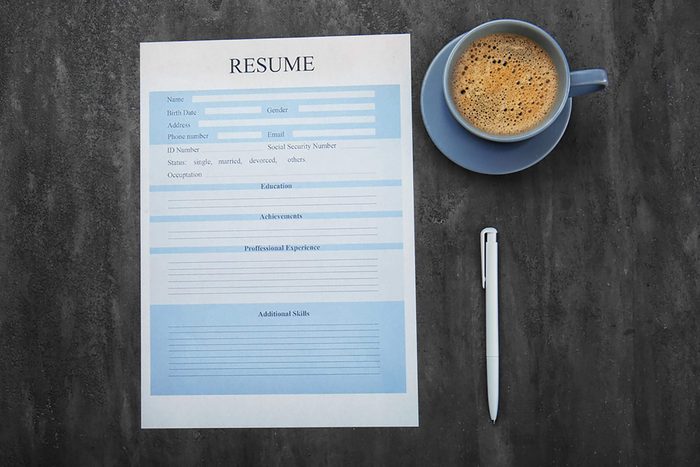
You have typos
Grammatical errors and misspellings may be the number-one cause of employer frustration with resumes. According to a 2013 CareerBuilder survey, 58 percent of employers said resume typos were one the biggest reasons they did not hire employees. Here are the worst mistakes job candidates have made, according to hiring managers.

You repeat the same phrases
Saying you “contributed” content to a company newsletter is fine the first time. However, if you say you also “contributed” to sales meeting objectives in the second line, your future employer’s eyes might start to glaze over. Change up your action verbs: You brainstormed, you initiated, you managed … you get the idea.

You write way too much
Too much text is a sign of a cluttered mind—and a crowded page is a headache to read. Keep your resume succinct and to the point. But do play up these job skills you didn’t know you had.

Your resume is overly creative
Do not design your resume using bubble letters, bright colors, and edgy graphics. Unless you are the next Andy Warhol, or your career requires dynamic visuals, keep your resume easy to read and follow. You can demonstrate your originality as soon as you are hired. Here are interview outfit mistakes that could cost you the job.

You fabricate and deceive
Lying (even fibbing) is never the way to secure a job. You are taking the chance of being caught. Not only are you pegged as a liar, but you also risk your reputation. Who knows who else in your industry that employer might warn about your deceit? Don’t miss these answers to the trickiest job interview questions you’re likely to get.

Your resume is disorganized
If you are applying for a marketing job, do not list your time as a waitress in high school. Think about your work history, and tailor your resume for each job to which you apply.

You brag about too many hobbies
You can play the violin, harp, flute, and the piano! While that is fantastic, your future employer does not need to know. Your skills should be relevant the job you are applying for.

You hype up your social media accounts
Unless it is essential to your job (say, a social media manager) no one needs to know your Facebook, Instagram, and Twitter account handles. Your social media information takes up valuable resume space, and could make you look like a less serious candidate. And it almost goes without saying that you’ll want to make sure you’re not posting any information on social media that could give your employer doubts about you.

You list references
Listing references on your resume, or writing “references available upon request,” makes you look out of touch. Employers will ask you if they want a reference.